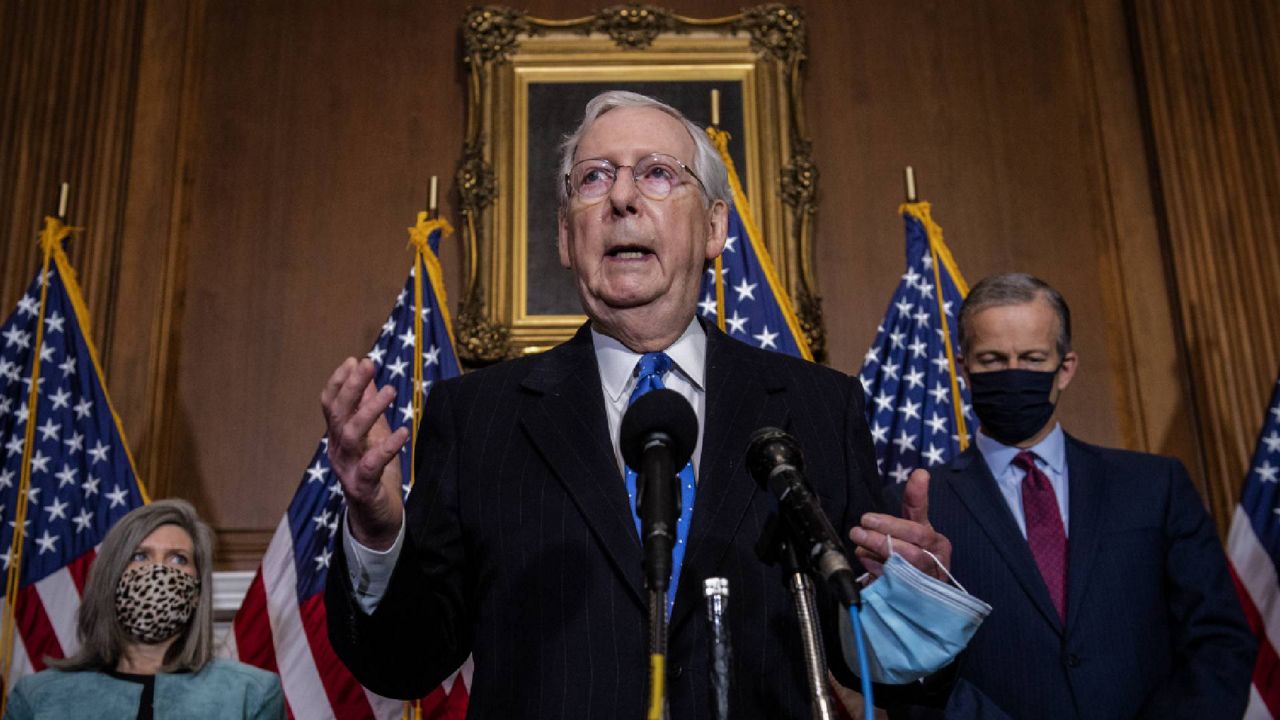On Thursday, lawmakers on both sides of the aisle and in both chambers of Congress expressed optimism and called for a compromise on coronavirus relief, after a stalemate that’s lasted for months, even amid a worsening pandemic and unemployment figures that remain high.
This week saw the most movement toward a deal in many weeks, as top congressional leaders restarted conversations and dozens of lawmakers expressed their hope of passing a deal before Congress leaves Washington for the holidays.
A bipartisan group of House lawmakers spoke outside the Capitol Thursday to call for emergency relief, speaking in support of a $908 billion proposal announced by a group of Democratic and Republican senators earlier this week.
“We are gaining momentum as we speak,” said Rep. Tom Reed (R-NY), who helps lead the House Problem Solvers Caucus. “We are not leaving until that signature is on this package.”
The $908 billion legislation was proposed by Senators Joe Manchin (D-W.Va.), Susan Collins (R-Maine), Mark Warner (D-Va.), Bill Cassidy (R-La.), among others.
It includes money for state and local governments, a $300 weekly unemployment benefit, a refresh of the Paycheck Protection Program for small businesses and money to bail out the transportation industry. It does not include another stimulus check for Americans.
Both House Speaker Nancy Pelosi and Minority Leader Sen. Chuck Schumer expressed support for the proposal, calling it a “basis” for discussions. President-elect Joe Biden also said a compromise deal is necessary for “immediate” relief, but he said he would want more aid in the new year.
Meanwhile on Thursday, Majority Leader Mitch McConnell (R-KY) called the new proposal “movement in the right direction,” but he continued to blame Democrats for the lack of compromise.
“Anyone who’s heard me speak about coronavirus relief going back months has heard one central principle: Let’s deliver right away on all the subjects where everybody agrees, and argue over the rest later,” he said, speaking on the Senate floor.
Leader McConnell has continually pushed for Senate Republicans’ proposal of a “targeted” $550 billion bill, which he’s said the president would sign, but it’s failed to pass.
For his part, President Trump also expressed optimism about a deal Thursday.
“I think we are getting very close,” he said in the Oval Office. “I want it to happen.”
On Tuesday, Treasury Secretary Steven Mnuchin also confirmed renewed talks, testifying in a Senate hearing that he spoke with both the president as well as Leader McConnell, House Minority Leader McCarthy and, separately, with Speaker Pelosi.
After that meeting, Secretary Mnuchin said he would review both the new bipartisan proposal as well as another put forth by Speaker Pelosi and Sen. Schumer this week, according to a statement from the speaker’s office.
In his testimony Tuesday, Sec. Mnuchin expressed optimism about the economy’s recovery so far this year, though he acknowledged the need for additional relief. He was joined by Federal Reserve Chair Jerome Powell, who painted a more grim picture of the economic future, calling the outlook “uncertain.”
Members of the House Problem Solvers Caucus spoke hours after the newest weekly unemployment report, which confirmed that jobless numbers remain high, with another 712,000 Americans applying for benefits last week.
“We can’t wait until tomorrow,” said Rep. Jimmy Panetta (D-CA). “Why? This pandemic is exploding, our hospitals are bursting and our economy is hurting.”
House members are set to leave Washington no later than next Friday, Dec. 11, House Majority Leader Steny Hoyer said on a call with reporters this week. Senators are set to go home on Dec. 20, according to the current Senate calendar.



